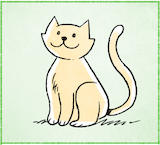
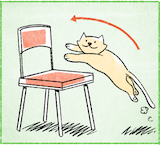
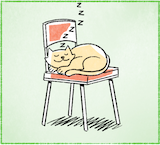
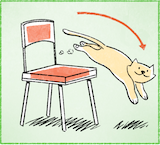
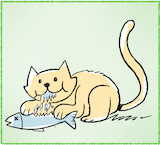
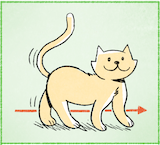
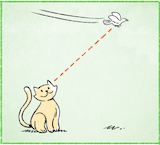
นี้คืออี่หยัง อันนี้เป็นแมว แมวโตหนึ่ง ตาฮักๆ
แล้วแมวมันเฮ็ดอี่หยังอยู่ มันกำลังนั่งอยู่ มันนั่งอยู่สะหนามหญ้า มันนั่งอยู่โตเดียวข้อหล้อ
มันมีหางของมันพ้อม หางของมันญาวๆ ญาวบักคักหนึ่ง
5
แมวโตนี้มันกำลังสิเฮ็ดหญัง แมวโตนี้มันกำลังสิกะโดด มันสิกะโดดขึ้นโต่ะ จักว่ามันสิกะโดดไปเฮ็ดหญัง
มันกะโดดจักโต มันกะโดดโตเดียว โตเดียวข้อหล้อของมันนั้นหละ กำลังญกขาหน้า กำลังญกขาหน้าสิกะโดดขึ้นไปเทิงโต่ะ มันอาดสิกะโดดขึ้นไปนอน หลืออาดสิกะโดดขึ้นไปเหล้นกะได้
แล้วโต่ะที่มันสิกะโดดขึ้นนั้นสูงบ่ บ่ บ่สูงปานใดดอก ขั้นมันสูงมันกะสิกะโดดขึ้นบ่ได้ ขั้นมันสูงหลายมันกะบ่สามาดกะโดดขึ้นไปได้
6
แมวมันกำลังเฮ็ดหญังอยู่ แมวมันกำลังนอนหลับอยู่ นอนเป็นตามีแฮงๆ มันนอนอยู่เทิงโต่ะนั้นหละ โต่ะที่มันหัวแต่กะโดดขึ้นไปนั้นหละ
โต่ะอันนี้กะพอดีๆ พอดีกับโตมันเอาโลด มันกะได้นอนพอดี โตมันกะส่ำโตพอดี นอนเป็นตามีแฮงหลาย กำลังกนก้อกๆ อยู่พุ้นหนะ
7
แมวมันกำลังเฮ็ดหญัง มันกำลังกะโดด มันกะโดดลงพื้น
วั่งหั้นมันอยู่เทิงโต่ะ มันกะเลยสิกะโดดลงพื้น หลือว่ากะโดดลงจากโต่ะ
แล้วมันกะโดดเล็วบ่ หลือว่ากะโดดไวบ่ จักคือกัน กะสิไวอยู่นั้นหละ มันอาดสิฟ้าวกะโดดลงกะได้ จักว่ามันสิไปใส มันอาดสิบ่อยากอยู่เทิงโต่ะนี้แล้วกะได้ มันกะเลยสิกะโดดลงไป
8
แมวมันเฮ็ดหญังอยู่ มันกำลังกินปา มันกำลังกัดกินปาอยู่
มือของมันเทิงสองข้างกำลังจับปาอยู่ แล้วปากของมันกะกัดปาขึ้นมากิน เป็นตาแซบหลาย คือสิแซบคัก
ปากะโตบักใหญ่หนึ่ง มันคือสิมีความสุขหลายที่มันได้กินปาโตนี้
9
แมวโตนี้มันสิญ่างไปใส จักคือกัน จักว่ามันสิญ่างไปใส
เห็นแต่มันญ่างไปข้างหน้าอยู่ จักว่ามันสิญ่างไปใส จักสิญ่างไปทางพุ้น หลือญ่างไปทางพี้ เฮากะบ่ฮู้คือกันเนาะ
แมวโตนี้เบิ่งซงแล้วเป็นตามีความสุขบ่ หางมันกะซี้โก่งโด่งอยู่พุ้นหนะ เป็นตามีความสุขหลาย
10
แมวมันกำลังเฮ็ดอี่หยัง มันกำลังแนมขึ้นฟ้าพุ้นหนะ
แล้วมันแนมไปเฮ็ดหญัง มันแนมเบิ่งนก มันอาดสิเห็นนกโตหนึ่งอยู่เทิงฟ้า มันกะเลยแนมขึ้นไปกะได้ มันอาดสิอยากกินนกโตนั้นกะได้ มันกะเลยแนมขึ้นไป
นกโตนั้นกะกำลังบินอยู่เทิงฟ้าพุ้นหนะ แมวโตนี้กะได้แต่แนม แล้วกะแนมเบิ่งซื่อๆ เฮ็ดหญังกะบ่ได้ กะได้แต่แนม
Link to overview page
Link to dictionary
| Isaan | Pronunciation | Tones | Thai | English/Notes |
|---|---|---|---|---|
| นี้ | ni: | HF | นี้ | 1. this 2. here |
| คือ | khʉ: | HR | คือ | 1. to be, to resemble, like, as 2. why {บักหล้าคือบ่เก็บโต่ะแน่ = [addressing a young boy] Why haven't you cleared the table?} |
| อี่หยัง | i:-yaŋ | H-M | อะไร | 1. what {นี้คืออี่หยัง = What is this?} {มื้อนี้เจ้าเฮ็ดอี่หยัง = What are you doing today?} {กินเข้างายกับอี่หยัง = What did you have for breakfast?} 2. something, anything, (in negations) nothing {บ่ต้องเฮ็ดอี่หยังอีกเลยนอกจากใส่ปุย = [we] don't need to do anything besides adding fertilizer} |
| อัน | an | M | อัน | 1. thing, object 2. general clf. for objects |
| เป็น | pen | M | เป็น | 1. to be, to exist 2. to be able to 3. to suffer, sth. happens to 4. เป็นหญัง[...]คือ in initial position: why? {เป็นหญังเขากะคือแปงฟัน = Why is he brushing his teeth?} {เป็นหญังเคี่ยงบินมันคือสิตก = Why is the airplane falling down?} |
| แมว | mɛ:o | HR | แมว | cat |
| โต | to: | M | ตัว | 1. body, self 2. clf. for animals, characters/letters/consonants, appliances, clothes (e.g., pairs of trousers, shirts) |
| หนึ่ง | nʉŋ | H | หนึ่ง | 1. one 2. after adjective: intensifier {บักคักหนึ่ง = very much} {อันบักใหญ่หนึ่ง = very large}, or attenuates the meaning {กะดาดมันแผ่นน้อยๆ หนึ่ง = the piece of paper is [relatively] small} |
| ตาฮัก | ta:-hak | M-H | น่ารัก | cute, lovely |
| แล้ว | lɛ:o | HF | แล้ว | 1. finished 2. already 3. and then, and next (especially แล้วกะ) 4. auxiliary for past tense |
| มัน | man | HR | มัน | it (also used to refer to people) |
| เฮ็ด | het | H | ทำ | to do, to make |
| อยู่ | yu: | H | อยู่ | 1. to be (located) at 2. yet, still 3. auxiliary indicating continuous or progressive action {ทอดปาอยู่ในกะทะ = (in the process of) frying a fish in the pan} {แม่กำลังเมี้ยนเฮียนอยู่ = mother is cleaning/tidying up the house} |
| กำลัง | gam-laŋ | M-HR | กำลัง | auxiliary indicating continuous or progressive action |
| นั่ง | naŋ | H | นั่ง | to sit |
| สะหนาม | sa-na:m | M-M | สนาม | lawn, field, ground, yard |
| หญ้า | ɲa: | LF | หญ้า | grass |
| เดียว | di:ao | M | เดียว | only, alone, single |
| ข้อหล้อ | khɔ:-lɔ: | LF-LF | เท่านั้น, ขนาดนั้น, น้อยๆ | only {ต้นไม้มีต้นเดียว ต้นเดียวข้อหล้อ = there's one tree, only one tree} {มีบ้านหลังเดียวข้อหล้อ = there's only one house} |
| มี | mi: | HR | มี | 1. to have 2. there is |
| หาง | ha:ŋ | M | หาง | tail |
| ของ | khɔ:ŋ | M | ของ | of, belonging to |
| พ้อม | phɔ:m | HF | พร้อม | at the same time, also, too {มีตะเว็นพ้อม = the sun's out, too} {กะทะมีด้ามพ้อม = the pan has also a handle} |
| ญาว | ɲa:o | HR | ยาว | long |
| บักคักหนึ่ง | bak-khak-nʉŋ | M-H-H | intensifier: very, very much (variant of คัก) | |
| สิ | si | M | จะ | future tense auxiliary {เขากำลังสิตื่น = he's about to wake up} {สิไปตะหลาด = [I'm] going to the market} |
| หญัง | ɲaŋ | M | อะไร, เป็นหญัง = ทำไม | 1. what {เขากำลังเฮ็ดหญัง = What is he doing?} {ธูปเอาไว้เฮ็ดหญัง = What are incense sticks for?} 2. something, anything, (nothing) 3. เป็นหญัง[...]คือ in initial position: why {เป็นหญังเขาคือใส่บักพิกลงไปในกวยเตียว = Why is he putting chili in [his] noodle soup?} {เป็นหญังหน้าต่างมันคือเปิด = Why is the window open?} {เป็นหญังมันคือมีควนไฟ = Why is there smoke?} |
| กะโดด | ga-do:t | M-LF | กระโดด | to jump Notes: see also โดด |
| ขึ้น | khʉn | LF | ขึ้น | 1. to go up, to increase 2. sun: to rise {ตะเว็นกำลังขึ้น = the sun is rising} 3. more 4. bus/train etc.: to get on, to board {พุโดยสานขึ้นลดไฟเบิดแล้ว = all passengers have boarded the train} |
| โต่ะ | to | H | โต๊ะ, เก้าอี้ | 1. table 2. chair |
| จัก | jak | M | จัก | 1. answer to a question: [I] don't know, don't know exactly, [I'm] not sure {พุซายคนนี้เขาเถ้าไป่ จัก จักเถ้าหลือบ่เถ้า เบิ่งบ่ค่อยออก = Is this man here already old? I don't know. I can't see clearly whether he's old or not.} {เขาเว้ากันอยู่ใส จักคือกัน = Where are they talking? I don't know either.} 2. exact(ly), what exactly {จักต้มอี่หยังกะบ่ฮู้ = I don't know what (exactly) he is cooking} {บ่ลู้คือกันจักปาอี่หยัง = I don't know either what kind of fish this is} 3. how much/many? {ต้นไม้มีจักต้น = How many trees are there?} {ตอนนี้จักโมงแล้ว = What time is it now?} {มือของเฮานี้สิมีจักนิ้ว = How many fingers do our hands have?} 4. a bit, a little bit {จักหน่อย/จักหน่อยหนึ่ง = a bit, a little bit} |
| ว่า | wa: | H | ว่า | 1. that, as {คำว่า X = the word X} 2. to say |
| ไป | pai | M | ไป | 1. to go 2. auxiliary indicating action extending into the future |
| นั้นหละ | nan-la | HF-M | นั่นแหละ | auxiliary for emphasis at the end of a phrase |
| ญก | ɲok | H | ยก | 1. to raise {ญกมือขึ้น = to raise the hand} {ญกโตอย่าง = to give an example} 2. to lift {เขากำลังญกก้อนหินขึ้น = he's lifting up the stone} |
| ขา | kha: | M | ขา | leg {ขาหน้า = front leg} {ขาหลัง = hind leg} {ส้งขาญาว = long trousers} |
| หน้า | na: | LF | หน้า | 1. front {ปะตูหน้า = front door} 2. face {เขากำลังล้างหน้า = he's washing his face} 3. auxiliary: conditional tense {เขาหน้าสิเป็นพุบ่าวพุสาวกัน = they are probably groom and bride} {กะหน้าสิส้มอยู่ = it's likely to be sour} 4. season {หน้าฮ้อน = hot season} 5. page 6. clf. for pages {เฮาอ่านฮอดหน้านั้นแล้ว = we've read until this page} |
| เทิง | thə:ŋ | HR | บน | 1. on, on top of, at, in {เทิงโต่ะ = at/on the table} {กบมันนั่งอยู่เทิงใบบัว = the frog is sitting on the lotus leaf} {เทิงท้องฟ้า = in the sky} {มันแล่นอยู่เทิงลาง = [the train] runs on rails} {มีคนนั่งอยู่เทิงลดสามล้อสามคน = there are three people sitting in the tuk tuk} 2. up, upward Notes: pronunciation: also realized as ทัง |
| อาด | a:t | LF | อาจ | 1. might, may, will 2. likely |
| นอน | nɔ:n | HR | นอน | 1. to lie down 2. to sleep |
| หลือ | lʉ: | M | หรือ | or |
| เหล้น | len | LF | เล่น | 1. to play, to enjoy oneself with, to do something for pleasure {เหล้นลูกบอน = to play ball} {เหล้นเกม = to play a game/games} {เหล้นน้ำ = to play with/in the water} {นั่งเหล้น = to sit} {กินเหล้น = to eat (as a snack), to snack} {เหล้นโน่ดบุ่ก = to use a laptop (for entertainment or work)} 2. to drop by, to spend time with, to come to visit {บ่ได้มาเฮ็ดหญัง มาเหล้นซื่อๆ = I've not come to do anything in particular, I'm just dropping by} |
| กะ | ga | M | ก็ | 1. then, consequently 2. also |
| ได้ | dai | HF | ได้ | 1. can 2. to get, to obtain 3. before verb: indicating past tense 4. บ่ได้ + verb: not |
| ที่ | thi: | H | ที่ | 1. that, which {คนที่ยืนอยู่ฝั่งขวา = the person which is standing on the right = the person standing on the right} {เว้าคำที่บ่สุพาบ = to speak words which are impolite = to speak impolitely} 2. for ordinal numbers {ที่สาม = third} |
| นั้น | nan | HF | นั้น | that, there |
| สูง | su:ŋ | M | สูง | high, tall |
| บ่ | bɔ: | H | ไม่ | 1. no, not 2. question particle, transforming a statement into a question Notes: spelling exception in line with common usage on social media |
| ปานใด | pa:n-dai | M-M | เท่าไหร่, มาก | 1. after negative: (not) very, (not) so much {บ่ใหญ่ปานใด = not so large, not very large} 2. how much, how many {เฮาบ่สามาดนับได้ว่ามันมีหลายปานใด = it's impossible to count how many there are} |
| ดอก | dɔ:k | LF | หรอก, ดอก | 1. particle used after a negative, relativizing or explanatory statement to make the sense milder {กินเข้าบ่ บ่กินดอก = Are you going to eat [with us]? No.} {เป็นก้อนสี่เหลี่ยม ก้อนน้อยๆ ดอก = These are cubes, small cubes.} {แล้วกะมีลดคันหนึ่งขี่ผ่านมา เป็นลดเก็งดอก = And there's a car passing, a sedan.} 2. particle used to emphasize (not necessarily a negative) contrast 3. particle used for emphasis {ดอกไม้นี้งามบ่ กะงามอยู่ เบิ่งงามๆ ดอก = Is this flower beautiful? Yes, it's beautiful, it looks beautiful} |
| ขั้น | khan | LF | เมื่อ | when, if |
| หลาย | la:i | M | เยอะ, มาก | many, much, very |
| สามาด | sa:-ma:t | M-HF | สามารถ | can, to be able |
| นอนหลับ | nɔ:n-lap | HR-M | นอนหลับ | to sleep |
| ตามีแฮง | ta:-mi:-hɛ:ŋ | M-HR-HR | น่าสบาย | happily, comfortably, feeling well |
| หัว | hu:a | M | เพิ่ง | just, just now, only just {คนที่หัวกะเคยพ้อกัน = someone [we've] just met} {หัวกะตื่น = [I've] just woken up} {หัวกะซักมา = [the shirt has] just [been] washed} |
| แต่ | tɛ: | H | แต่ | 1. but {แต่บ่ต่างกันหลาย = but not very different} {แต่บ่ลู้ว่าเขาญ่างมาแต่ใส = but [I] don't know where he's coming from, see also: แต่ว่า} 2. only {ตอนนี้มีแต่ขี้ฝ้า = now there are only clouds} |
| พอดี | phɔ:-di: | HR-M | พอดี | 1. to fit well 2. appropriate, just enough, just right {กะจกบานบ่ใหญ่ กะจกบานพอดี = not a large window, just right} {พอดีมือของเฮา = just right for his hand} 3. just in time, at the right moment, just this moment {แล้วพุซายคนนี้กะญ่างมาพอดี = and the man has come just now} |
| กับ | gap | M | กับ | 1. and {ลุงกับป้า = uncle and aunt} {กวยเตียวหมูกับกวยเตียวไก่ = noodle soup with pork and noodle soup with chicken} 2. with, to {ค้ายๆ กับคำว่า ... = similar to the word ...} 3. prefix in front of foods {กับเข้า = side dishes eaten with rice} {เขากินกับกวยเตียว = he's eating noodle soup} |
| เอาโลด | ao-lo:t | M-HF | เอาเลย, ทำเลย, จริงๆ | in final position: intensifier {โตส่ำกะทะเอาโลด = [a fish] as large as the pan!} {เกียบเต็มถ้วยเอาโลด = the bowl is almost full!} {ทะนาคานมันสิไปตั้งไว้อยู่ซู่หม้องเอาโลด = banks are everywhere!} |
| ส่ำ | sam | H | 1. what size?, what shape? {พุหญิงคนนี้ผมญาวส่ำใด = How long is this woman's hair?} 2. equal to (in size), as large as {โตบักใหญ่หนึ่ง โตส่ำกะทะเอาโลด = a large [fish], filling the whole pan} {อายุส่ำกัน = to be of the same age} {[หนังสือพิม]สิมีข้อมูนบ่หลายส่ำหนังสือ = [a newspaper] doesn't have as much information as a book} |
|
| กน | gon | M | กรน | to snore |
| ก้อกๆ | gɔ:k | HF | onomatopoeic: sound of someone snoring | |
| พุ้นหนะ | phun-na | HF-H | นู่นแหละ | auxiliary for emphasis at the end of a phrase Notes: variant of พุ้นหละ |
| ลง | loŋ | HR | ลง | 1. to descend, to lower, to go down 2. down 3. bus/train etc.: to get off, to disembark {คนกำลังลงลดบั่ด = people are getting off the bus} 4. boat/ship etc.: to get on, to board {เขากำลังญ่างลงเลีย = he's boarding/getting on the boat} |
| พื้น | phʉ:n | HF | พื้น | 1. floor, ground 2. surface, area {หล่นลงไปลงพื้น = [it] falls to the ground} {เขานั่งอยู่เทิงพื้น = he's sitting on the floor} |
| วั่งหั้น | waŋ-han | H-LF | เมื่อกี้ | just now |
| เลย | lə:i | HR | เลย | 1. futher on, beyond, past {เข็มน้อยเลยเลขสิบสองไป = the minute hand has passed number twelve} 2. too much 3. at all 4. definitively 5. completely, utterly |
| จาก | ja:k | LF | จาก | 1. from {... เฮ็ดมาจากอี่หยัง = ... is made from what?} 2. to depart |
| เล็ว | leo | HR | เร็ว | fast, quick |
| ไว | wai | HR | ไว | quick, fast, speedy |
| คือกัน | khʉ:-gan | HR-M | เหมือนกัน | 1. also, likewise, similarly {ยินดีที่ได้ฮู้จักคือกันคับ = Nice to meet you too!} 2. in negative sentences: either {บ่ลู้คือกัน = I don't know either} {จักคือกัน = I don't know (either)} |
| ฟ้าว | fa:o | HF | รีบ | to hurry, to rush |
| ใส | sai | M | (ที่)ไหน | 1. where? {สิไปใส = Where are [you] going?} {มาแต่ใส = Where are [you] coming from?} {กะทะอยู่ใส = Where's the pan?} 2. somewhere, anywhere {ใสกะได้ = anywhere, wherever you like} |
| อยาก | ya:k | LF | อยาก | to want, to wish |
| กิน | gin | M | กิน | to eat, to consume, to use |
| ปา | pa: | M | ปลา | fish |
| กัด | gat | M | กัด | to bite |
| มือ | mʉ: | HR | มือ | 1. hand 2. front leg/paw (e.g., of a cat) |
| เทิง | thə:ŋ | HR | ทั้ง | 1. up to, all, all of, the whole of, altogether {เขาใส่กางเกงขาสั้นเทิงสองคน = both are wearing short trousers} {เขาเป็นพ่อของลูกเทิงสามคนนี้ = he's the father of these three [children] here} 2. เทิง ... เทิง ...: both ... and ..., ... as well as ... {เทิงมีใบพ้อม เทิงมีเหลียนพ้อม = there are notes as well as coins} Notes: pronunciation: also realized as ทัง |
| สอง | sɔ:ŋ | M | สอง | two |
| ข้าง | kha:ŋ | LF | ข้าง | 1. side {มีหูจับสองข้าง = there are handles on both sides} 2. next to {วางอยู่ข้างๆ ก่องใบใหญ่ = it's placed next to the large box} {เขายืนอยู่ข้างๆ อีกพุหนึ่ง = he's standing next to another person} 3. clf. for body parts which come in pairs (eyes, ears, legs etc.) {เขามีตาสองข้าง = she has two eyes} |
| จับ | jap | M | จับ | 1. to grasp, to hold {เขาจับมือกัน = they're holding hands} {เขายืนจับไอติมอยู่ = she's standing, holding an ice cream} 2. to catch, to arrest {จับพุล้าย = to arrest a criminal} |
| ปาก | pa:k | LF | ปาก | mouth |
| มา | ma: | HR | มา | 1. to come 2. auxiliary expressing action towards the present or focal time {กะคุเฮ็ดมาจากอี่หยัง = What is the bucket made of?} {แล้วเขากะเก็บเงินจากพุนั้นมา = and then she takes the money of that person} |
| ตาแซบ | ta:-sɛ:p | M-HF | น่ากิน | 1. tasty looking, to be appetizing 2. to be sleeping well {นอนเป็นตาแซบหลาย = [he's] sleeping well} |
| แซบ | sɛ:p | HF | อร่อย | 1. food: tasty {กวยเตียวมันแซบบ่ = Is the noodle soup tasty?} 2. sleep: well {เป็นตานอนแซบคัก = it looks as if she's sleeping very well} |
| คัก | khak | H | intensifier: very, very much | |
| บัก | bak | M | 1. intensifier before adjectives {ปาโตบักใหญ่ = a (very) large fish} 2. prefix in front of fruits and vegetables {บักแตงโม = watermelon} 3. can be used as a reference for a male person of the same or younger age {บักอันนี้ = this lad} |
|
| ใหญ่ | ɲai | H | ใหญ่ | large, big |
| ความสุข | khwa:m-suk | HR-M | ความสุข | happiness |
| ญ่าง | ɲa:ŋ | H | เดิน | to walk {เขากำลังญ่างเว้ากัน = they are walking and talking} {ลูกเป็ดญ่างไปนำแม่เป็ด = the ducklings are [walking] following their mother} {เขากำลังญ่างข้ามสะพาน = she's walking over the bridge} {เขาสิญ่างไปใส = Where is he going?} |
| เห็น | hen | M | เห็น | to see |
| ข้างหน้า | kha:ŋ-na: | LF-LF | ข้างหน้า | in front, forward |
| ทาง | tha:ŋ | HR | ทาง | 1. way, direction {พุหญิงกะสิไปทางหนึ่ง พุซายกะสิไปอีกทางหนึ่ง = the woman goes one way, the man another way} {ตะเว็นไปทางใด = Where has the sun gone?} {เขาถีบจักกะย๊านไปทางหน้า = he's biking on/onward/forward} {มาเว้า มาว่าเฮาในทางที่บ่ดี = he's scolding [me], he's talking to me improperly} 2. by, through, via etc. {เว้าทางโทละสับ = to talk on the phone} |
| พุ้น | phun | HF | นู่น | over there |
| พี้ | phi: | HF | นี่ | over here |
| เฮา | hao | HR | เรา | 1. personal pronoun: we 2. personal pronoun: I |
| ฮู้ | hu: | HF | รู้ | 1. to know 2. to understand Notes: equivalent to ลู้ |
| เนาะ | nɔ | H | เนาะ | final particle: makes the statement softer, looking for agreement |
| เบิ่ง | bəŋ | H | ดู | 1. to look at, to see, to watch {เบิ่งโทละทัด = to watch TV} {เบิ่งหนัง = to watch a movie} 2. to guess {เบิ่งซงแล้ว ... = [I] guess / from what it looks like ...} |
| ซง | soŋ | HR | ทรง | 1. shape, form 2. as if, like Notes: translation to be confirmed |
| ตามีความสุข | ta:-mi:-khwa:m-suk | M-HR-HR-M | happy, to look happy | |
| ซี้ | si: | HF | ชี้ | to point, to indicate, to show |
| โก่งโด่ง | go:ŋ-do:ŋ | H-H | ตั้งขึ้น, ยาวออกไป, ลักษณะชี้ขึ้นข้างบน | to stand up, to be erect |
| แนม | nɛ:m | HR | มอง | to look, to glance, to stare {เขากำลังยืนแนมก้อนหินอยู่ = he's standing and looking at the stone/rock} {ข้างหนึ่งแนมเห็น อีกข้างหนึ่งแนมบ่เห็น = [we] see one side, [we] can't/don't see the other side} |
| ฟ้า | fa: | HF | ฟ้า | 1. sky {เคี่ยงบินมันกำลังบินขึ้นฟ้า = the airplane is taking off into the sky} 2. color: blue |
| แนมเบิ่ง | nɛ:m-bəŋ | HR-H | มองดู | 1. to look at 2. to watch |
| นก | nok | H | นก | bird |
| บิน | bin | M | บิน | to fly |
| ซื่อๆ | sʉ: | H | เฉยๆ | 1. just so 2. so-so |